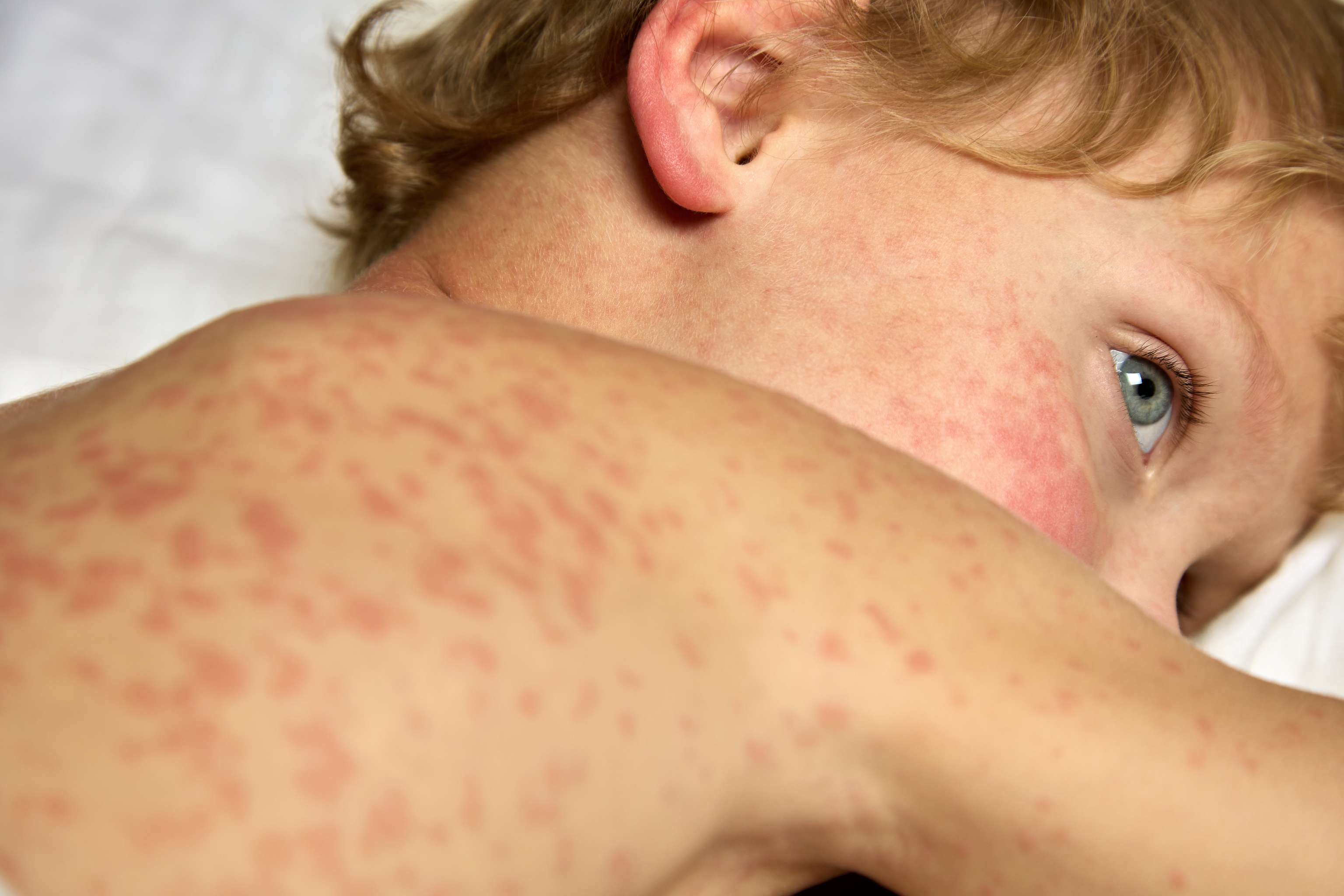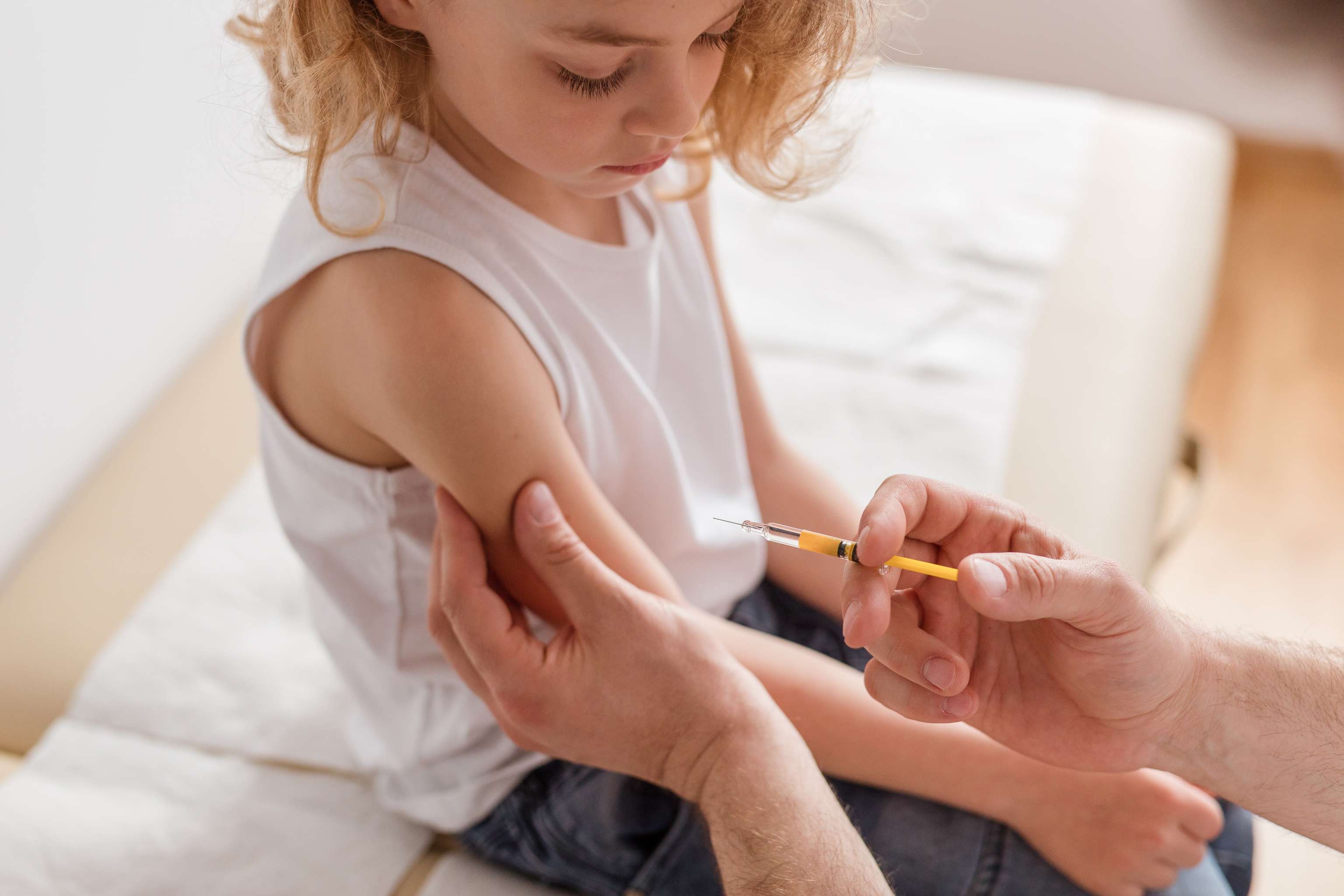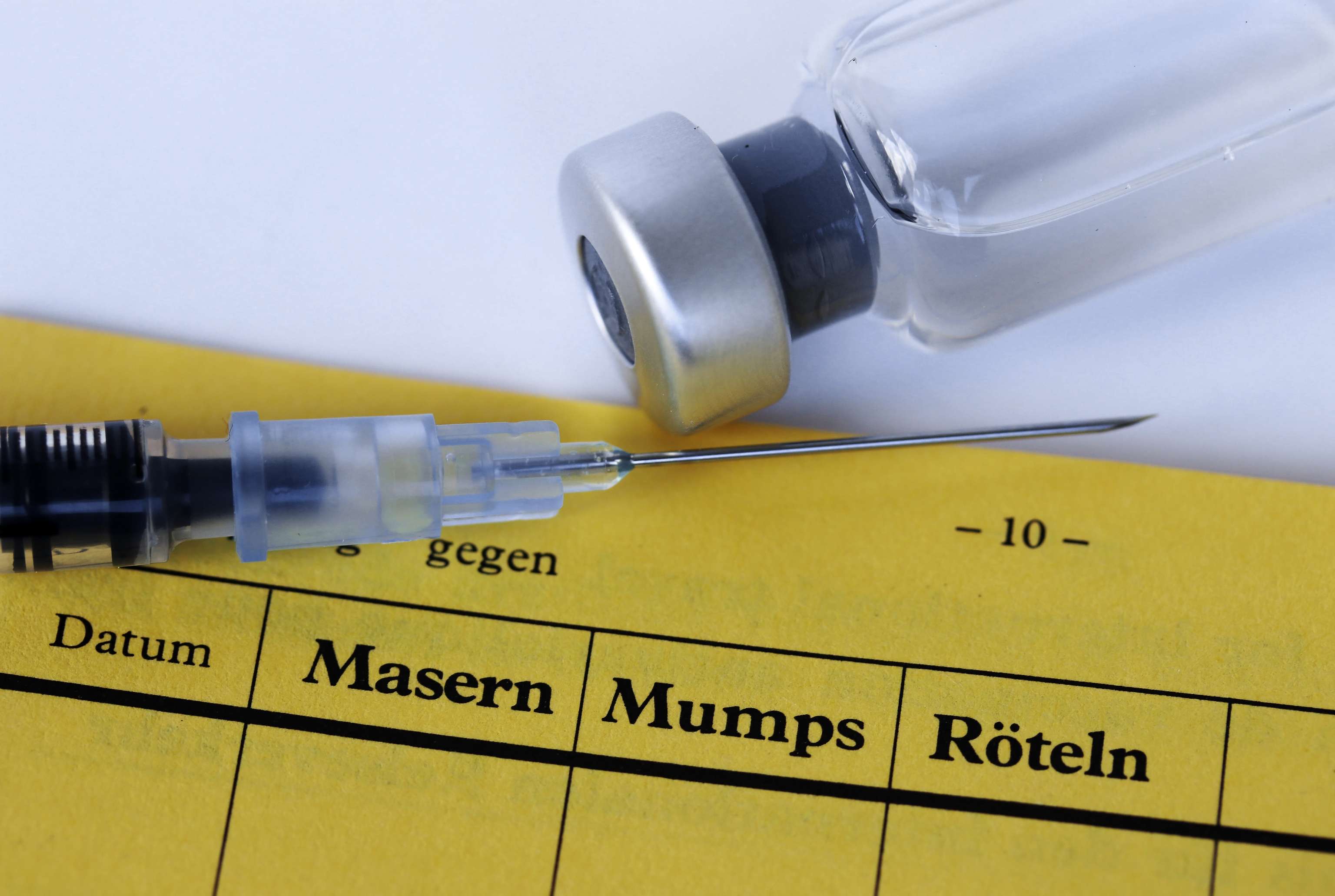Measles is caused by a highly contagious virus via droplet infection and can have serious health consequences, especially for infants, children and adolescents, but also adults. After the incubation period, symptoms usually include rhinitis, cough, fever, conjunctivitis and the typical rash in the form of red spots on the face. In uncomplicated cases, the rash recedes within a few days and the fever drops.
The return of measles

Vaccination
Vaccinations are nowadays one of the most important preventive measures against infectious diseases. Protection develops through immunization of the body against the pathogen. In epidemiology, the vaccination coverage of a population contributes significantly to achieving so-called herd immunity. This community protection also protects individuals from infection who are unable to be vaccinated. The goal of herd immunity is the long-term elimination of pathogens. In the past, achieving herd protection through consistent and worldwide vaccination programs has already eradicated quite a few diseases. For example, the World Health Organization (WHO) has set itself the goal of halting the global spread of measles and rubella. To achieve this, community protection in the form of an immunity rate of at least 95% must be in place.
Requirements of the D-A-CH countries
In Germany, the new measles protection law has been in effect since March 1, 2020, which requires measles vaccination. For all children over the age of one, proof must be provided when registering at a daycare center or at the latest when starting school. Persons born in 1970 or later who work in medical or community settings or as teachers, educators or caregivers must also provide proof of double measles vaccination. The same applies to asylum seekers and refugees.
In Switzerland and Austria, there is currently no obligation to provide proof of immunization against measles. Measles-mumps-rubella vaccination is recommended from the age of 9 months and can be repeated free of charge at public vaccination centers at any time during adulthood. Measures to eradicate measles have been discussed in the Austrian National Measles/Rubella Elimination Action Plan.
Current measles wave in Austria
In recent weeks, there have been new confirmed cases of measles in Styria. The infections can be observed in unvaccinated persons, among whom several children have fallen ill. Meanwhile, several cases have also been reported in Carinthia and one in Vienna. The Ministry of Health has called for free immunization and in some cities special vaccination campaigns are being held without registration. After only one case was reported in the last two years and the last outbreak with 40 cases took place in 2019, this year we can speak of a renewed wave of infections. The loosening of the mask requirement and the declining vaccination coverage rate in recent years are likely contributing to the incidence of infection.
Why is immunization against measles so important?

The weakening of the immune system caused by a measles infection is so severe that it makes it difficult to defend against other pathogens for months to years after infection. This increases the risk of developing complications such as bronchitis, middle ear and larynx infections, bronchitis or gastrointestinal infections. The probability of suffering from one of these sequelae is 20%.
In 1-2 people per 1,000 who fall ill, a so-called measles encephalitis (inflammation of the brain) can occur. One third of those affected by this secondary disease suffer permanent damage such as mental disabilities or paralysis, and about 10-20% of those who contract the disease die.
In rare cases, approximately 5 in 10,000 cases, subacute sclerosing panencephalitis (SSPE) may occur. This complication, which is always fatal, can also occur with a delay of 6 to 8 years after a measles infection. In this so-called "slow-virus" measles infection, the white matter of the brain degrades continuously. Children who contract measles at birth or in the first year of life are particularly susceptible to SSPE.
Since there is no specific treatment for measles, the infection is mostly treated symptomatically, for example with antipyretic or analgesic drugs. Despite high vaccination rates in the D-A-CH region, infections still occur frequently in unprotected individuals. Vaccination with the widely tested and well-tolerated combination vaccine against measles-mumps-rubella is the only effective measure to protect against infection.
Vaccination situation and vaccination behavior
The past decades have shown that the spread of infectious diseases such as measles can be halted by widespread immunization. Nevertheless, the vaccination coverage rate in Austria is not high enough to provide sufficient community protection and even seems to be steadily declining, as an evaluation by the Ministry of Health shows.
Although the number of vaccinations had only fallen by just under 5%, this decline mainly affects young children. Compared to 2020, when 95% of 2-year-olds received at least the first and 88% the second partial vaccination, the following year for the same age group, vaccination coverage rates were only 84% for the first and 74% for the second partial vaccination. Vaccination rates in 2021 are somewhat higher among slightly older children (2 to 5-year-olds), at 95% for the first and 88% for the second partial vaccination. Even among 6- to 9-year-olds, the 95% target will be reached only for the first partial vaccination. In contrast, herd protection continued to be maintained for both partial vaccinations in the 10 to 18-year-old age group. In the young adult age group, there is again insufficient vaccine protection with both partial vaccinations.

Vaccination patterns are also likely to have changed during the pandemic. Measures to contain the covid-19 virus have led to a decline in routine vaccinations (especially among children) and further increased vaccination gaps. For example, gaps in coverage resulted in an additional nearly 9 million children not being vaccinated against diphtheria, tetanus, pertussis, and measles in the recommended timeframe.
At the same time, increasing skepticism about vaccination is leading to a decline in routine immunizations. The prevention paradox refers to a dilemma that, in this case, stems from the success story of vaccination itself: due to high vaccination coverage rates, certain diseases are becoming rarer and rarer, and people therefore make the assumption that vaccinations are no longer necessary. The clinical picture of a disease disappears from consciousness and at the same time the side effects and rare real as well as potential sequelae of vaccination tend to be seen as more serious than the infectious disease itself. Moreover, herd immunity created by consistent vaccination also protects the non-vaccinated, but this is often seen as a counter-argument to vaccination.
All of these factors can lead to a distrust of vaccination, which manifests itself in lower vaccination readiness, lower vaccination coverage rates, and partial or complete refusal to vaccinate. This may result in new outbreaks of infectious diseases, but these in turn could promote vaccination readiness.
Conclusion
Austria has made a commitment to the WHO to pursue its goal of eradicating measles. Current insufficient immunization coverage rates are not sufficient to achieve herd immunity, which could adequately protect all individuals from infection. Instead, immunization rates continue to decline. In Styria and other federal states, it is now urgently recommended to catch up on measles vaccination or to complete vaccination protection in order to stem the current wave of measles there. This represents an important measure for prevention against infection and its complications.
Sources
- Robert Koch Institut. (2021). Masern. RKI-Ratgeber.
- Bundeszentrale für gesundheitliche Aufklärung. (o.A.). Masernschutzgesetz. Masern-Impfung.
- Bundesministerium für Soziales, Gesundheit, Pflege und Konsumentenschutz. (o.A.). Durchimpfungsraten & Nationaler Aktionsplan.
- Bundesministerium für Soziales, Gesundheit, Pflege und Konsumentenschutz. (2022). Kurzbericht Masern 2021.
- Causey, K., Fullman, N., Sorensen, R. J. D., Galles, N. C., Zheng, P., Aravkin, A., Danovaro-Holliday, M. C., Martinez-Piedra, R., Sodha, S. V., Velandia-González, M. P., Gacic-Dobo, M., Castro, E., He, J., Schipp, M., Deen, A., Hay, S. I., Lim, S. S., & Mosser, J. F. (2021). Estimating global and regional disruptions to routine childhood vaccine coverage during the COVID-19 pandemic in 2020: a modelling study. Lancet (London, England), 398(10299), 522–534.
- BZgA. (2021). Gemeinschaftsschutz: Schutz für den Einzelnen und die Gemeinschaft.
- BZgA. (2022). Präventionsparadox.

Olivia Malvani, BSc
Last updated on 28.02.2023
Your personal medication assistant
Browse our extensive database of medications from A-Z, including effects, side effects, and dosage.
All active ingredients with their effects, applications, and side effects, as well as the medications they are contained in.
Symptoms, causes, and treatments for common diseases and injuries.
The presented content does not replace the original package insert of the medication, especially regarding the dosage and effects of individual products. We cannot assume liability for the accuracy of the data, as the data has been partially converted automatically. Always consult a doctor for diagnoses and other health-related questions.
© medikamio